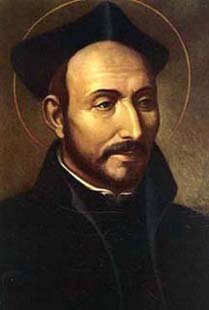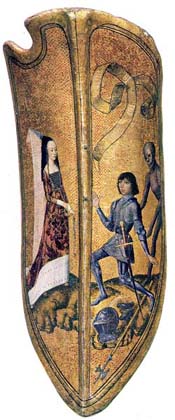 |
The Saint of the Day
St. Ignatius of Loyola, July 31
Prof. Plinio Corrêa de Oliveira
Biographical selection:
Ignatius was born in northern Spain in 1491 at the Castle of Loyola. The youngest son of Don Beltran, Lord of Onaz and Loyola, he entered into service at the court of King Ferdinand V at age 15. He chose to pursue a military career.
During the siege of Pamplona he was gravely injured by a cannonball that struck his right leg. During his convalescence he profited from reading the lives of the Saints. He came to understand that the Church also had a militia to defend the interests of God, the Lord of Hosts.
At Montserrat, Ignatius laid aside his sword at the altar of the Holy Virgin. He founded the Society of Jesus with the goal of combating Protestantism, Jansenism, and the neo-paganism prevalent at that time.
He wrote the book Spiritual Exercises to form his disciples. He chose as motto of his Society: Ad majorem Dei gloriam – All for the greater glory of God [A.M.D.G.]. He died on July 31, 1556 pronouncing the name of Jesus.
Comments of Prof. Plinio:
This selection does not sufficiently describe the key note of St. Ignatius’ work, the most profound sense of his conversion, which would determine the rest of his life. Let me try to fill this void.

St. Ignatius Loyola
|
St. Ignatius lived at a time when the tradition of medieval Chivalry still existed and had a strong influence. In his Spiritual Exercises one notes the presence of this tradition. For example, looking at the parable of the king who is a great general and invites his knights to fight with him, St. Ignatius asks this question: “Who would be so base and vile as to refuse such an invitation?”
It is a valid question and a well made argument to spiritually move the person who is making the Exercises. But what I would like to point out is the backdrop of the scene, which is the feudal ambience. St. Ignatius was describing the feudal system of vassalage, whereby a knight owes allegiance to his lord, and he was pointing out the disloyalty of the noble who does not follow his king. St. Ignatius presupposes the knight he addresses to be a medieval knight. Another confirmation of this can be found in his meditation on the two standards, the one of Christ, our Commander-in-chief, and the other of Lucifer, mortal enemy of our human nature, which also makes up a part of his Spiritual Exercises.
At the time of St. Ignatius, Chivalry had become decadent. Much of its style and many rituals remained the same, but an essential part had changed. I am referring to the dedication of the knight to the service of God, Our Lady, and the Holy Church. The ideal of a complete renunciation of the world in order to dedicate one’s life completely to the supernatural fight had passed away. The knight of that time was no longer a knight for the Catholic Church. His life was dedicated to serving his king and his lady. The notion of a sacred knighthood was dying.

A knight placing himself at the service of his lady, rather than the Holy Church
|
The conversion of St. Ignatius took place during this period. During his convalescence, his first desire was to read books on this romantic Chivalry, but none were available in the castle. He read the lives of saints to pass time because that is what was at hand. As he read, however, he realized the great ideal of the saints as warriors of God and a sublime notion of Chivalry took hold of his spirit. This sublimation represented on one hand, a return to the previous supernatural ideal of medieval Chivalry, and on the other hand, an even more perfect ideal than the medieval Chivalry.
When he decided to found the Society of Jesus, he was thinking of making an order of Chivalry, a military order. Compañia de Jesus is the Spanish name he chose for his work. Compañia means company, or army. He wanted to found an order exclusively turned to the fight for the Church, putting aside any other temporal concern. What he did was to restore the sacral knighthood.
The chivalry he founded did not have the sacramental of knighthood; it had the priesthood, that is, a participation in the Sacrament of Holy Orders. The new priest-warriors he envisioned would be a new style of warrior, warriors who did not shed blood, but entered the battle in response to a new type of attack inaugurated by the enemies. They would fight by means of the word: preaching, teaching, hearing confessions, and converting people in order to conquer the world for Our Lord Jesus Christ.
To make a religious order with a military spirit and way of being was the idea of St. Ignatius. The Society of Jesus is an army, its head is a general, the hierarchy is military, the obedience is military, the action is combative and carried out in a militant style.
This was the reason why the Society of Jesus was so combative - and also so combated by the enemies.
We can understand today how different the Society of Jesus has become when we see it promoting all kinds of reconciliation with the enemies of the Church.
What should we ask St. Ignatius on his feast day? To restore his work, to help to restore the whole Church immersed in this enormous crisis she has fallen into since Vatican II, to give us his spirit of combativeness and love for the Catholic cause.


  | | Prof. Plinio Corrêa de Oliveira | |
The Saint of the Day features highlights from the lives of saints based on comments made by the late Prof. Plinio Corrêa de Oliveira. Following the example of St. John Bosco who used to make similar talks for the boys of his College, each evening it was Prof. Plinio’s custom to make a short commentary on the lives of the next day’s saint in a meeting for youth in order to encourage them in the practice of virtue and love for the Catholic Church. TIA thought that its readers could profit from these valuable commentaries.
The texts of both the biographical data and the comments come from personal notes taken by Atila S. Guimarães from 1964 to 1995. Given the fact that the source is a personal notebook, it is possible that at times the biographic notes transcribed here will not rigorously follow the original text read by Prof. Plinio. The commentaries have also been adapted and translated for TIA’s site.
|
Saint of the Day | Home | Books | CDs | Search | Contact Us | Donate

© 2002- Tradition in Action, Inc. All Rights Reserved
|
 |

|